4. LabVIEW Generation from IDL¶
While creating a DDS application in LabVIEW, the user must create Topic VIs which map to DDS topic types. In addition to registering a topic, the user neeeds to create DDS Read and DDS Write VIs. LabVIEW data is represented in clusters. The DDS Read and Write VIs have terminals that require a LabVIEW cluster. On data writes, the LabVIEW clusters are converted to DDS topic types and on data reads, the DDS topic types are converted to LabVIEW clusters.
The user can generate the LabVIEW clusters and DDS VIs from an IDL file.
The DDS LabVIEW Integration supports generation of LabVIEW typedefs and VIs from IDL. This chapter describes the details of the IDL-LabVIEW binding.
4.1. Generating LabVIEW VIs from an IDL File IDLPP¶
DDS Topic Types can be described in an IDL file. The LabVIEW IDL generation is done using the Import_IDL Tools menu in LabVIEW.
Tools/VortexDDS/Import_IDL
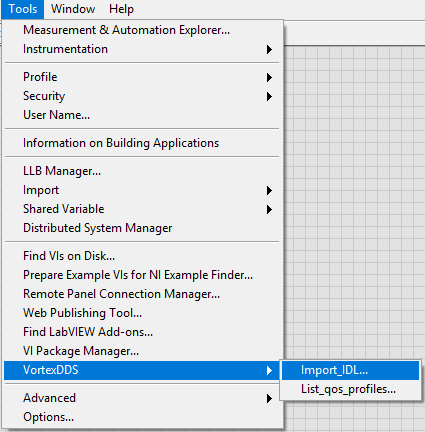
In the IDL file, ensure that any topic structures have the OSPL specific annotation pragma keylist defined. This value is added as a keylist constant to the key terminal of the generated RegisterTopic.vi.
Select the IDL file and a folder for the generated VIs.
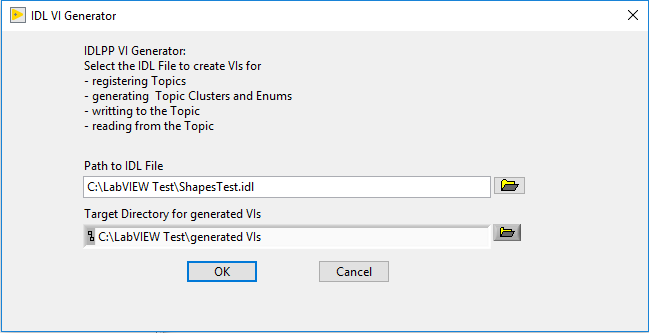
Upon successful generation the VIs are located in the folder that was chosen. A dialog box appears indicating the path of the generated VIs and the IDL file.
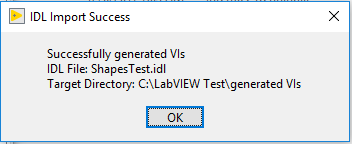
4.2. Generated Artifacts¶
The following table defines the LabVIEW artifacts generated from IDL concepts:
IDL Concept |
LabVIEW Concept |
Comment |
|---|---|---|
module |
Appended to the name of each VI contained in the module |
|
enum |
enum |
a LabVIEW .ctl file. |
enum value |
enum value |
|
struct |
cluster |
a LabVIEW .ctl file. |
field |
cluster field |
|
sequence |
array |
|
array |
array |
Datatype mappings
The following table shows the LabVIEW equivalents to IDL primitive types:
DDS IDL |
LabVIEW Type |
|---|---|
boolean |
Boolean |
char |
int8 |
octet |
uint8 |
short |
int16 |
unsigned short |
uint16 |
long |
int32 |
unsigned long |
uint32 |
long long |
int64 |
unsigned long long |
uint64 |
float |
single-precision floating point |
double |
double-precision floating point |
string |
String |
Unsupported DDS data types |
|
wchar |
not supported |
wstring |
not supported |
any |
not supported |
long double |
not supported |
union |
not supported |
inheritance |
not supported |
Generated VIs and controls
For each struct in the IDL file, the following VIs and controls are generated:
RegisterTopic.vi
Write.vi
Read.vi
CicoTable.vi (Copy-in copy-out)
Topic cluster.ctl (corresponds to each struct in IDL File)
Enum.ctl (corresponds to each enum in IDL File)
The “moduleName_structName” is appended to the name of each VI and control that is generated.
4.3. RegisterTopic.vi¶
The RegisterTopic.vi represents a DDS topic type. The DDS topic corresponds to a single data type. In DDS, data is distributed by publishing and subscribing topic data samples.
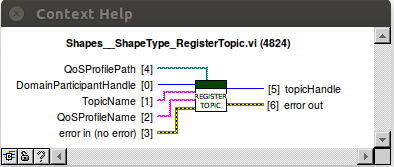
Terminal Type |
Optional |
Name |
Description |
Output consumed by |
|---|---|---|---|---|
Input |
no |
DomainParticipantHandle |
DDS Domain Participant entity instance |
|
Input |
no |
TopicName |
DDS Topic Name |
|
Input |
yes |
QosProfilePath |
QoS file uri |
|
Input |
yes |
QoSProfileName |
Name of QoS profile |
|
Input |
yes |
error in (no error) |
Input Error cluster |
|
Output |
no |
topicHandle |
DDS Topic entity instance |
create_reader.vi create_writer.vi |
Output |
yes |
error out |
Error out cluster |
4.4. Read.vi¶
The DDS Read.vi is used to read DDS samples from a specific topic.
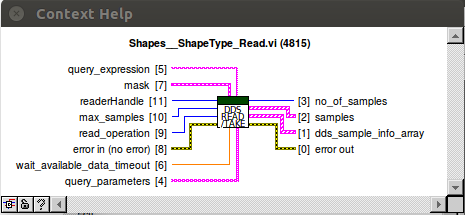
Terminal Type |
Optional |
Name |
Description |
Output consumed by |
|---|---|---|---|---|
Input |
no |
readerHandle |
DDS Reader entity instance |
|
Input |
yes |
mask |
read_condition masks LabVIEW cluster |
|
Input |
yes |
max_samples |
maximum number of samples to read |
|
Input |
yes |
read_operation |
READ or TAKE default operation is TAKE |
|
Input |
yes |
query_expression |
expression to filter samples based on a query |
|
Input |
yes |
query_parameters |
parameters for the query expression |
|
Input |
yes |
wait_available_data _timeout |
wait for data available timeout (seconds) |
|
Input |
yes |
error in (no error) |
Input Error cluster |
|
Output |
yes |
no_of_samples |
Number of samples read |
user |
Output |
no |
samples |
LabVIEW cluster |
user |
Output |
yes |
dds_sample_info_array |
sample information |
user |
Output |
yes |
error out |
Error out cluster |
4.4.1. Filters¶
The filtering of incoming samples can happen based on a query and/or on a sample read condition(s).
Query
query_expression: The expression is a SQL condition.
query_parameters: Each parameter element must be an array element.
Note: Query expressions are only validated at runtime. If they are incorrect, errors will occur while running the VI.
Read Condition
The read condition mask specified will filter the samples that are read or take(n).
Example: For a reader, the Sample State has Not Read selected and Read deselected.
Only samples with a Sample State Not Read will be processed with read or take. Any samples with the Read sample state will not be read or take(n).
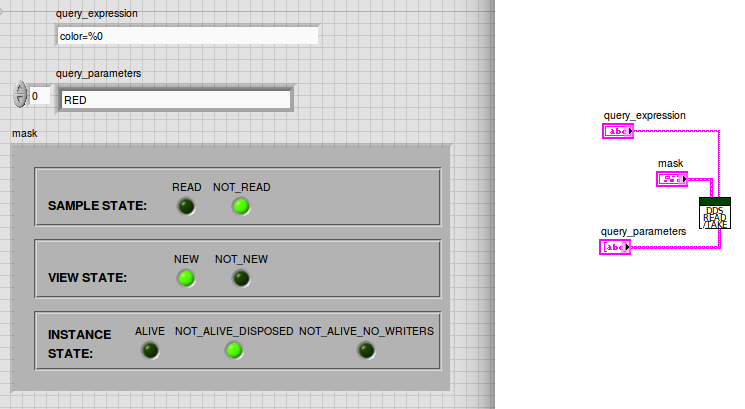
4.5. Write.vi¶
The DDS Write.vi is used to write DDS samples to a specific topic.
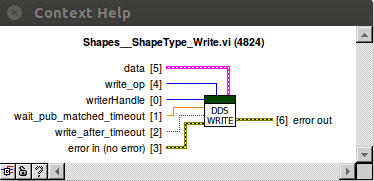
Terminal Type |
Optional |
Name |
Description |
Output consumed by |
|---|---|---|---|---|
Input |
no |
writerHandle |
DDS Writer entity instance |
|
Input |
yes |
write_op |
write operation: WRITE, DISPOSE, WRITE_DISPOSE Default operation: WRITE |
|
Input |
no |
data |
samples LabVIEW cluster |
DDS |
Input |
yes |
wait_pub_matched _timeout |
wait for publication matched timeout (seconds) |
|
Input |
yes |
write_after_timeout |
write samples after timeout |
|
Input |
yes |
error in (no error) |
Input Error cluster |
|
Output |
yes |
error out |
Error out cluster |
